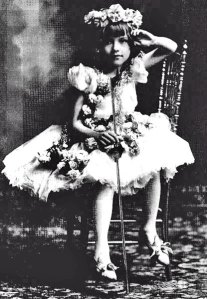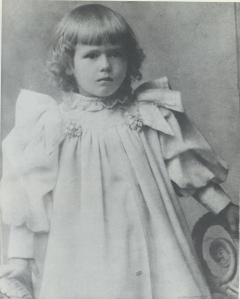The following are a series of excerpts from Mary Pickford’s 1955 autobiography “Sunshine & Shadow”, unless otherwise noted.
“It wasn’t long after Father’s death that Mother decided to rent the master bedroom, as there was plenty of space in that large house for the family.
One day a well-dressed man applied for the vacant room. Up to then the room had been occupied only by women. But this man explained that he was married and he was sure Mother would like his wife. The pros and cons of the situation were warmly debated by Mother, Aunt Lizzie, and Grandma. They finally agreed that renting the room under these circumstances would be quite respectable — a decision which was probably the greatest turning point in my life. The man in question was the stage manager of the Cummings Stock Company of Toronto.
One day, about two weeks after the couple were installed, the man asked Mother if he could have a moment with her. “Mrs. Smith,” he began, “you have read the papers that I’m producing a play called The Silver King. “I believe I have”. “Well would you consider letting your two little girls appear in a schoolroom scene?” Mother was highly indignant. “I’m sorry, ” she said, “but I will never allow my innocent babies to associate with actresses who smoke.” “I respect your misgivings, Mrs. Smith, ” the man said, “but will you do me a favor before you make a final decision?” “It’s completely out of the question. The thought of those infants making a spectacle of themselves on a public stage! ….” “This is all I ask, Mrs. Smith. Come backstage with us tonight. I assure you that professional people are no different from any others. They are good, bad, and indifferent like the rest of the world. This happens to be a very happy and respectable group of actors and actresses who have been together a long time.” Mother made the daring trip backstage that night and was evidently impressed by the behavior of the people in the company. The result of that tour of inspection was that Lottie and I made our debut in the theater in a play called The Silver King.


Gladys Smith debuts in "The Silver King"
I played two parts. In the first act I was a villainous little girl who was mean to Cissy Denver, the Silver King’s daughter. My opening line on stage was: “Don’t speak to her girls; her father killed a man!” — a statement accompanied by a smart stamp of the foot, in which I had been very meticulously coached. My sister Lottie’s function in the play was just as elaborate, but without words. Hers was the kindly gesture of handing Cissy a stick of peppermint candy and giving her a pat on the back.
In the last act I played Cissy’s brother, Ned Denver, a part without lines in which I was supposed to sit very quietly on stage while my father, the “Silver King”, had a secret conversation with his wife. I had been carefully instructed to play with a set of wooden blocks and a toy horse and make myself as inconspicuous as possible. Instead I built the blocks into a giant pyramid and ran the toy horse into them. The “Denver’s” were startled by my sudden improvisation, and the audience must have laughed more at the expressions on their faces than at me.
When the final curtain fell, the stage manager came up to me and said, “You were a very smart little girl to think of that piece of business.” “Thank you sir,” I said. “You got yourself the biggest laugh of the evening.” “Thank you sir,” I repeated, beginning to feel that I was a very great actress indeed. “Yes, you were very clever tonight,” he went on, pitching his voice to a grave tone,” “but don’t ever steal a scene from a fellow actor again. “Oh, I would never do that sir!” “Do you realize you spoiled the speeches of the Silver King and his wife?” “No sir.” “… that the audience didn’t hear what they had to say? That so long as you stay in the theater you must never draw attention away from the main action?” “Yes sir,” I said, feeling very deflated. “But I’m going to do something irregular, Gladys,” said the stage manager.” “I’m going to let you keep that little piece of ‘business’ in.” And he told me the spot where I could get my laugh without interfering with the other players.
That was my first lecture in the good manners and ethics of the theater. I was only five years old, but the lesson sank in and I don’t think I ever forgot it. To this day I don’t like a scene stealer, even when it is myself.
Shortly after the Cummings Stock Company moved on to fresh pastures, I was given a role in a variety show – a small, silent, and sleeping role in a one-act play entitled, The Littlest Girl. My performance consisted of being carried on the stage and passed from the arms of one actor into the lap of another. On the same variety bill was a young girl named Elsie Janis. Mother whispered to me in awe that they were paying this girl the unbelievable salary of seventy-five dollars a week. My own salary was fifteen dollars a week. Elsie’s repertory included a magnificent imitation of Edna May and another of Anna Held, in brilliant diamonds, knee-length dress, and a white, diamond studded staff. Mother and I were simply dazzled as Elsie sang. “Oh I just can’t make my eyes behave!” Mother, not wanting to miss so rare an opportunity, took my hand and went in to consult Elsie’s Mother as to how one went about preparing for so brilliant a career as her daughter’s.
“Take her to see the finest plays and artists, ” said Mrs. Janis. “But she must never imitate anyone, other than to be a mimic. In anything else, first and above all, let her be herself.” That advice served me well in the years that followed. Elsie and I later became and remained good friends and so did our mothers.

Gladys Smith as "The Littlest Girl"
Mother, needless to say, had become quite stage-minded by now, and when she read that a new group, the Valentine Stock Company, was going to put on The Silver King, she finished her day’s work and put me into my Sunday best. “We’re going down to see whether they’ll take you for the same parts again, darling. I had thoughts of my own at that moment, but I said nothing. While we were being interviewed by Miss Anne Blanke, head of the company, much to Mother’s mortification, I suddenly spoke up and said: “I want to play Cissy Denver.” To Mother’s astonishment Miss Blanke said: “I don’t see any reason why you shouldn’t.” “But Miss Blanke,” interrupted Mother. “She can’t read, and it’s a long part.” Recognizing a friend and a kindred soul, I went over to Miss Blanke and I put my hand in hers and looked up into her face: “Please lady, let me try.” This melted my mother. “Well,” she said, “there can’t be any harm in trying. We’ll begin working on it tonight but I know she can’t remember such a long role.” I had made up my mind that I could and would, and I just had to prove it to Mother. The moment we left the theater and were outside under the lamppost waiting for the streetcar, we set to work. Mother read the lines and cues to me and I repeated them. We were still studying when the streetcar arrived and we continued all the way home. Before I went to bed that night I knew the entire first act by heart.
There was another reason I was so determined to play the role of Cissy Denver. Before our interview with Miss Blanke I had been taken to the matinees of the Valintine Stock Company. I was so little I would sit on my mother’s, my Aunt Lizzie’s or my cousin’s lap, which enabled me to look over the heads of people in front and saved the price of an extra seat. The Silver King was going to be played by a very attractive man named Jack Webster, and the truth of the matter is that I had fallen in love with him. That was all in the back of my mind when I asked for the part of Cissy Denver – Webster was to be my father in the play.
If I inherited a love of the stage, it must have been from my Irish grandfather. Mother often told me how long before I was born this jovial Hennessey would stand outside the theater waiting to be the first to enter. One night he persuaded Grandma Hennessey to go along with him. They were seated when a fire wagon went clanging past. Convinced that her house was on fire and that her children were already being consumed by the flames, Grandma rushed from the theater, and with a very irate Grandpa Hennessey in her wake hurried home to find house and family completely unscathed. That was enough theater for Grandma. “Never again,” she announced, ” will I pay good money to make a fool of myself watching other people making fools of themselves”.
After I started acting I had very little chance for formal schooling. My only real schooling, in fact, took place one winter when I was six at the Louisa Street School in Toronto, which my father and all his brothers and sisters had attended. In those days Mother often had to leave so early for work that Lottie and I had to wash and dress ourselves. We were always rushed off like mad for school, and we were very often late. I’ll never forget the terror of hearing that school bell ring while Lottie and I were still a half block away from our goal. Miss Adams, the principal, had repeatedly conveyed to us how she abhorred tardy pupils. One day when Lottie and I were late twice in succession Miss Adams scolded us viciously and hurled these terrifying words at us: “The next time you are late, the devil will send a big black wagon for both of you, and you will never see your mother again.” Lottie and I didn’t wait to hear another word. We didn’t even put on our hats and coats and leggings. With one impluse we dashed out into the subzero weather. Falling and sliding and weeping till the tears froze on our faces, we made for home. Mother, who happened to be home early that morning, was unpacking some purchases in the ktichen, when we came crashing in, leaving the ouside door wide open, speechless with terror. Panting and trembling, we finally managed to report what Miss Adams had said. Mother was quietly furious. Assuring us it was all nonsense, she put warm clothes on Lottie and me and took us back to the schoolroom. When she confronted Miss Adams, she clamly asked whether she had made that monstrous threat about the devil coming to take us off in a big black wagon. “Most certainly I did, Mrs, Smith,” retorted the principal. “And that was very mid to what they deserved.” “And what, in your estimation, Miss Adams, did they deserve?” asked Mother. “A good sound thrashing!” To which Mother very gravely replied that if Miss Adams ever laid a hand on Lottie and me she would not be answerable for what she might do to her; that she was going to the Board of Education the very next day to lodge a complaint against her. For weeks after that I would jump out of bed at night screaming, “The black wagon! No, no!”



 Posted by themarypickfordblog
Posted by themarypickfordblog 



